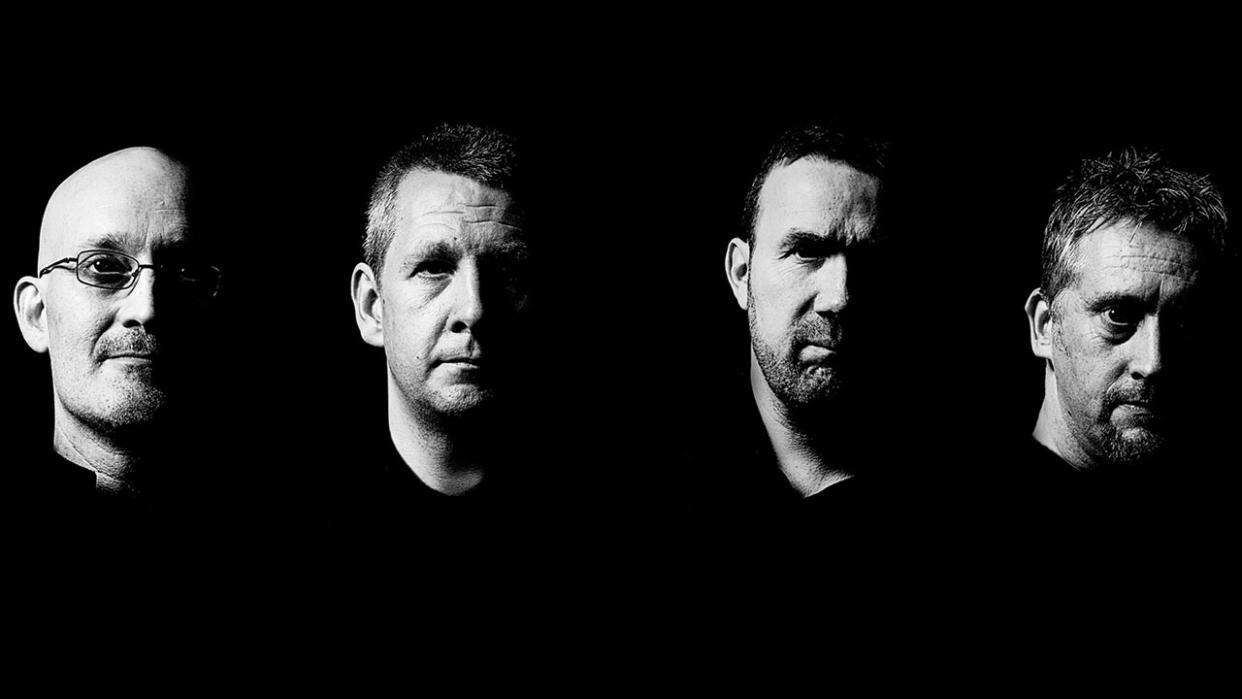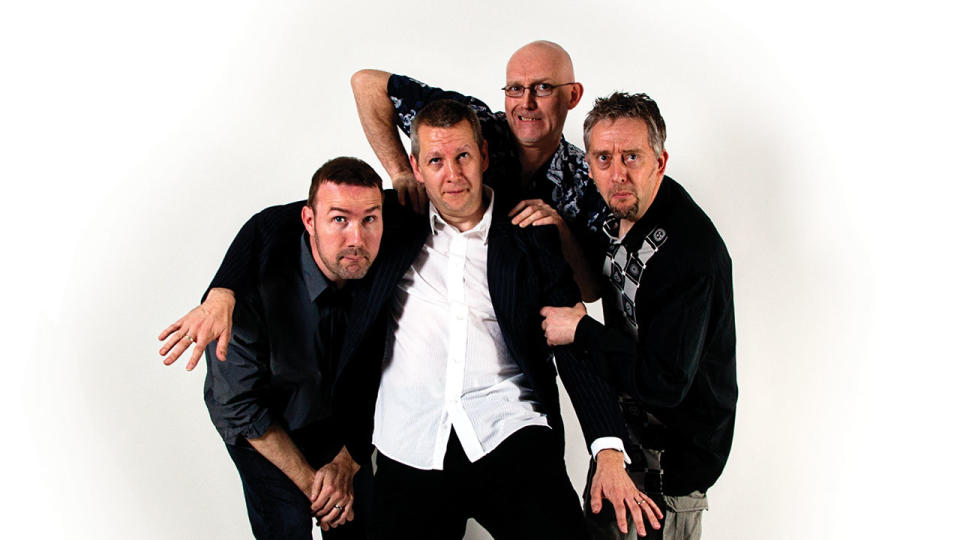"We figured if you were in a band, you got girls and it was a whole moment of ‘Well, I’ve got to lose my virginity before I’m 30’." The inspiration for Tinyfish's The Big Red Spark

"I was basically being a twat and fell from a tree, plummeted 30 feet onto a concrete floor and promptly broke both of my arms. I’m amazed I’m still here, actually,” laughs Tinyfish frontman Simon Godfrey.
For most people, such teenage antics would lead to nothing better than a hospital visit and a sense of acute embarrassment. But for Godfrey, fate decreed that because of his plastered limbs, he was justifiably excused from the rigours of PE lessons at his school. That enforced sidelining meant having to spend time with Jim Sanders, who, because of a severe eye condition was undergoing his own sedentary recuperation.
“We knew of each other before, but it was at that time we got to know each other better as friends, simply because we were forced having to sit on a wall, watching other people play football or rugby, and making conversation. I had just broken my arms but he could have lost his sight, so he wasn’t in the best of moods, shall we say, at that time. But I’m a blabbermouth and he couldn’t get away from me really, the poor bugger.”
After exhausting all other avenues of small talk, the conversation turned to music, which led to the pair eventually forming a band and a musical union that has continued to this day.
“We started playing music in college, and I would really love to tell you that it was because we were great devotees of progressive music and we wanted to move the genre forward. The reality was that we figured if you were in a band, you got girls and it was a whole moment of ‘Well, I’ve got to lose my virginity before I’m 30’,” confesses Godfrey. “So as a result we said, ‘Well what do we like?’ and we liked heavy metal and progressive rock. So we thought ‘We’ll do those then shall we?’ Once we realised it was a lot more fun than we had thought, that was when we started getting really serious about making music.”

The band’s 2006 debut, in spite of the low-budget manner of its creation, received glowing reviews and sold vastly more copies than the 500 that the band were expecting to shift.
“As our first album, and as a statement of who we are, I’m still very proud of it,” beams Godfrey. “I might want to return to it and remix it now I’ve got a little bit more experience. There were a couple of tracks that were left off that album because we didn’t have time and they weren’t really appropriate for it. So there might come a time when one day I will want to return to it and do that hackneyed old thing of remixing and remastering that everyone seems to be doing. I think it would be a little bit arrogant of me though to remaster our first album when I’ve only just released our second.”
Tradition decrees that second albums are notoriously awkward to create,
on the basis that a band have had a lifetime to lovingly craft a debut, whereas
a follow-up has to be produced in a far shorter timescale. That said, Tinyfish have taken four years to write and record their new release, The Big Red Spark, a delay caused in no small part to Godfrey’s self-confessed perfectionist streak.
“To be honest, it was pulling teeth,” he laughs. “You hear stories about bands like Tears For Fears taking forever over Seeds Of Love, and this was a hard album for us record. The thing is, I’m a stickler for detail. I have to pay attention to every single detail on the album. Everything from the timing of the backing vocal or a drum beat. That attention to detail, when you’re doing it all on your own, really takes time. It’s that moment of knowing that you’ve got to finish the job, be that putting up shelves, weeding the back garden or finishing an album. You think ‘I’ve just got to finish this my way’.”
The Big Red Spark is also a vastly more intricate and ambitious project than its predecessor. An archetypal concept album dealing with sci-fi themes, it exudes confidence and much like Transatlantic’s The Whirlwind contains several distinct songs which have been moulded together to create a continuous 55-minute piece. Seemingly, part of that newly found self-assurance came in part from the input of their lyricist and onstage narrator Rob Ramsay.
“If there is one thing that sets us apart from other progressive bands, it’s Rob Ramsay,” says Godfrey. “Rob comes on stage, dresses up in strange costumes and stuff, and delivers these very esoteric speeches about oblique subjects. It winds as many people up as it enthrals others. I think he’s a very Marmite guy and we’ve turned off as many people by having Rob in the band as we have drawn them in.
"But you kind of want people to love or hate you in that respect because you’ve got to stand on your own two feet. I was struggling when we started writing this music together and he was saying ‘Well what’s the problem here?’ I said I wasn’t entirely sure that I can play some of this stuff live. He said to me ‘Write the best music you possibly can and then worry about playing it live.’ And he was absolutely right. Once I understood that, the confidence seeped back into my songwriting.”

Perhaps surprisingly, in view of the album that Tinyfish have shaped in The Big Red Spark, Godfrey reveals that he’s not a fan of epic progressive tracks. Yet as he explains, the challenge of constructing such a strikingly luxuriant piece of music was impossible to ignore.
“I’m not a big fan of epics. I don’t mind listening to them but I always get the impression that the wheel is being reinvented when I hear a band writing a 30-minute song,” he says. “As a result, I like things that are more on a grand scale and the album that I took as a point of reference was Jeff Wayne’s War Of The Worlds. So we decided that the album should have a grander narrative but we would split it into smaller songs. The best way you can describe it is that rather being a film, it’s like a mini-series. It means to can pick your songs and gave us a bit more flexibility.
"I actually originally thought that the concept of the album was going to be just one song. I told the story to Rob and he said 'there’s more mileage to this.’ It obviously caught his imagination and I didn’t think any more about it until three or four weeks later he came back and he’d written all these chapters. As we started working out the lyrics for the songs, the ideas he was having fitted in with the theme behind The Big Red Spark. It was at that time we thought we could do something a bit grander than just song-silence-song-silence.”
Tinyfish have also decided against using a keyboard player this time, preferring a guitar-based sound, which, given the challenge of replicating the musical complexities on stage, Godfrey is perhaps beginning to regret.
“I still believe that the most interesting music is being made by guitar-led bands and that was one reason why we felt it wasn’t an immediate priority to get a keyboard player. But now we’ve recorded this album, I’m wishing we bloody had because of all of the parts I’m going to have to play onstage…”
This article originally appeared in issue 12 of Prog Magazine.

